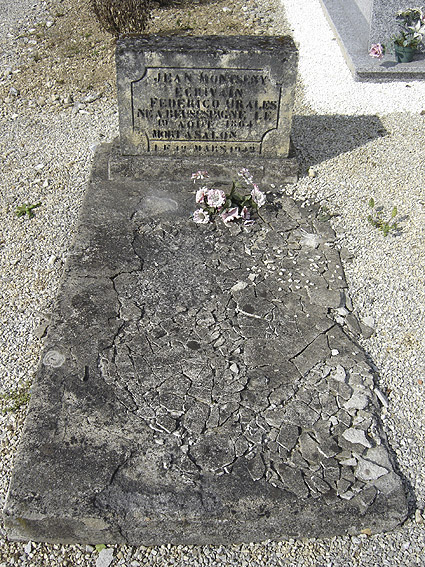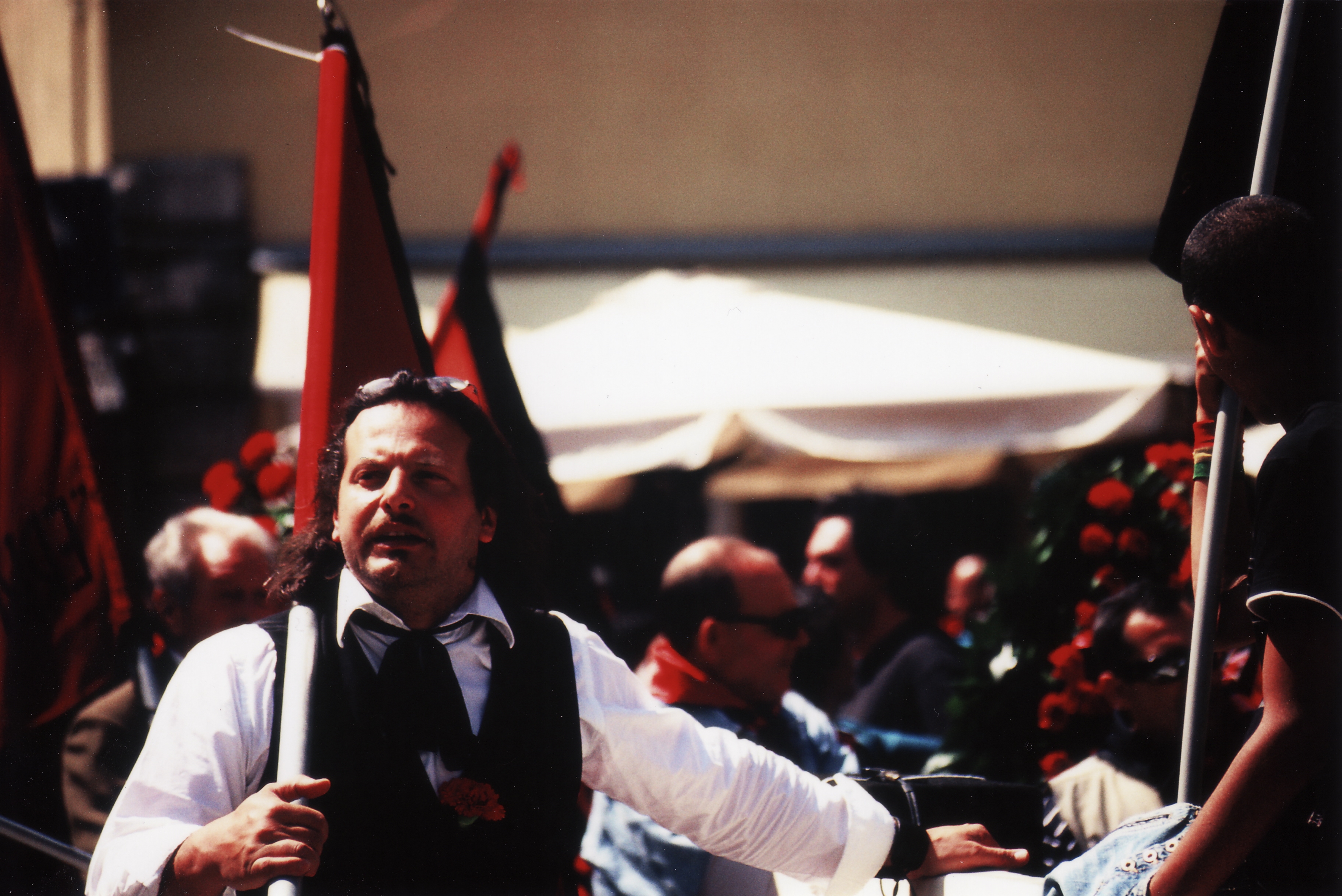|
Anarcho-naturism
Anarcho-naturism, also referred to as anarchist naturism and naturist anarchism, appeared in the late 19th century as the union of anarchist and naturist philosophies. In many of the alternative communities established in Britain in the early 1900s, "nudism, anarchism, vegetarianism and free love were accepted as part of a politically radical way of life". In the 1920s, the inhabitants of the anarchist community at Whiteway, near Stroud in Gloucestershire, "shocked the conservative residents of the area with their shameless nudity". Mainly, it had importance within individualist anarchist circles in Spain, France, Portugal and Cuba. Anarcho-naturism advocates vegetarianism, free love, nudism, hiking and an ecological world view within anarchist groups and outside them. Anarcho-naturism also promotes an ecological worldview, small ecovillages, and most prominently nudism as a way to avoid the artificiality of the industrial mass society of modernity. Naturist individualist anarchi ... [...More Info...] [...Related Items...] OR: [Wikipedia] [Google] [Baidu] |
Anarchist
Anarchism is a political philosophy and Political movement, movement that seeks to abolish all institutions that perpetuate authority, coercion, or Social hierarchy, hierarchy, primarily targeting the state (polity), state and capitalism. Anarchism advocates for the replacement of the state with Stateless society, stateless societies and voluntary Free association (communism and anarchism), free associations. A historically left-wing movement, anarchism is usually described as the libertarian wing of the socialist movement (libertarian socialism). Although traces of anarchist ideas are found all throughout history, modern anarchism emerged from the Age of Enlightenment, Enlightenment. During the latter half of the 19th and the first decades of the 20th century, the anarchist movement flourished in most parts of the world and had a significant role in Labour movement, workers' struggles for emancipation. #Schools of thought, Various anarchist schools of thought formed during ... [...More Info...] [...Related Items...] OR: [Wikipedia] [Google] [Baidu] |
Walden
''Walden'' (; first published as ''Walden; or, Life in the Woods'') is an 1854 book by American transcendentalism, transcendentalist writer Henry David Thoreau. The text is a reflection upon the author's simple living in natural surroundings. The work is part personal declaration of independence, social experiment, voyage of spiritual discovery, satire, and—to some degree—a manual for Self-sustainability, self-reliance. ''Walden'' details Thoreau's experiences over the course of two years, two months, and two days in a cabin he built near Walden Pond amidst woodland owned by his friend and mentor Ralph Waldo Emerson, near Concord, Massachusetts, Concord, Massachusetts. Thoreau makes precise scientific observations of nature as well as metaphorical and poetic uses of natural Phenomenon, phenomena. He identifies many plants and animals by both their popular and scientific names, records in detail the color and clarity of different bodies of water, precisely dates and describe ... [...More Info...] [...Related Items...] OR: [Wikipedia] [Google] [Baidu] |
La Revista Blanca
''La Revista Blanca'' was a Spanish individualist anarchist magazine of sociology and arts published in Madrid by Joan Montseny (Federico Urales) and Teresa Mañé (Soledad Gustavo) from 1898 to 1905 and in Barcelona Barcelona ( ; ; ) is a city on the northeastern coast of Spain. It is the capital and largest city of the autonomous community of Catalonia, as well as the second-most populous municipality of Spain. With a population of 1.6 million within c ... from June 1923 to August 1936. References Bibliography * * External linksDigitalized numbers of ''La Revista Blanca'' at the Spanish National Library 1898 establishments in Spain 1936 disestablishments in Spain [...More Info...] [...Related Items...] OR: [Wikipedia] [Google] [Baidu] |
Federico Urales
Joan Montseny i Carret (1864–1942), who also wrote under the pseudonym Federico Urales, was a Catalan anarchist activist and journalist from Spain. Early life and career Joan Montseny was born in Reus, Spain, in 1864. He was originally a cooper and led a union of coopers in the late 1880s. Montseny studied to become a teacher and ran a school in his hometown in 1891. In the early 1890s, Montseny's activity in the anarchist movement led to several arrests and his involvement in the Montjuïc trial and subsequent June 1897 exile to London, though later that year, he illegally returned to Madrid to press for judicial review of the trial. Montseny became a journalist. He worked on Alejandro Lerroux's ''El Progreso'' before founding the periodicals ''La Revista Blanca'' (1898) and ''Tierra y Libertad'' (1902). The success of these publications led to relationships with notable intellectuals, though Montseny was forced away from the papers in 1905 and 1904, respectively. He sp ... [...More Info...] [...Related Items...] OR: [Wikipedia] [Google] [Baidu] |
Émile Gravelle
Émile Gravelle (1855–1920) was a French people, French individualist anarchist and naturist activist, writer and painter.Etudes Jean-Jacques Rousseau Musée Jean-Jacques Rousseau - 1996 Le fondateur du Naturianisme est Émile Gravelle. Né en 1855 à Douai, il a quarante ans quand il crée ce mouvement. Il est alors artiste- peintre et dessinateur, et il a décidé de consacrer son art à la cause anarchiste." He published the review ''L'État Naturel'' (1894–1898) and collaborated with Henri Zisly and Henri Beylie on ''La Nouvelle Humanité'', ''Le Naturien'' (1898), ''Le Sauvage'' (1898–1899), ''L'Ordre Naturel'' (1905), and ''La Vie Naturelle'' (1907–1914). His ideas were important in individualist anarchist circles in France as well as Spain, where Federico Urales (pseudonym of Joan Montseny) promoted the ideas of Gravelle and Zisly in ''La Revista Blanca'' (1898–1905). References 1855 births 1920 deaths Anarchist writers Egoist anarchists ... [...More Info...] [...Related Items...] OR: [Wikipedia] [Google] [Baidu] |
Henri Zisly
Henri Zisly (born in Paris, 2 November 1872; died in 1945) was a French individualist anarchist and naturist. He participated alongside Henri Beylie and Émile Gravelle in many journals such as ''La Nouvelle Humanité'' and ''La Vie Naturelle'', which promoted anarchist-naturism. Zisly's political activity, "primarily aimed at supporting a return to 'natural life' through writing and practical involvement, stimulated lively confrontations within and outside the anarchist environment. Zisly vividly criticized progress and civilization, which he regarded as 'absurd, ignoble, and filthy.' He opposed industrialization (arguing that machines were inherently authoritarian), defended nudism, advocated a non-dogmatic and non-religious adherence to the 'laws of nature,' recommended a lifestyle based on limited needs and self-sufficiency, and disagreed with vegetarianism Vegetarianism is the practice of abstaining from the Eating, consumption of meat (red meat, poultry, seafood, in ... [...More Info...] [...Related Items...] OR: [Wikipedia] [Google] [Baidu] |
Anarchism In France
Anarchism in France can trace its roots to thinker Pierre-Joseph Proudhon, who grew up during the Restoration and was the first self-described anarchist. French anarchists fought in the Spanish Civil War as volunteers in the International Brigades. According to journalist Brian Doherty, "The number of people who subscribed to the anarchist movement's many publications was in the tens of thousands in France alone." History The origins of the modern anarchist movement lie in the events of the French Revolution, which the historian Thomas Carlyle characterized as the "open violent Rebellion, and Victory, of disimprisoned Anarchy against corrupt worn-out Authority". Immediately following the storming of the Bastille, the communes of France began to organize themselves into systems of local self-government, maintaining their independence from the State and organizing unity between communes through federalist principles. Direct democracy was implemented in the local districts of ... [...More Info...] [...Related Items...] OR: [Wikipedia] [Google] [Baidu] |
Utopian Socialism
Utopian socialism is the term often used to describe the first current of modern socialism and socialist thought as exemplified by the work of Henri de Saint-Simon, Charles Fourier, Étienne Cabet, and Robert Owen. Utopian socialism is often described as the presentation of visions and outlines for imaginary or futuristic ideal and socialist societies that pursue ideals of positive inter-personal relationships separate from capitalist mechanisms. However, later socialists such as the Marxists and the critics of socialism both disparaged utopian socialism as not being grounded in actual material conditions of existing society. Utopian socialist visions of ideal societies compete with Revolutionary socialism, revolutionary and social democratic movements. Later socialists have applied the term ''utopian socialism'' to socialists who lived in the first quarter of the 19th century. They used the term as a pejorative in order to dismiss the ideas of the earlier thinkers as fanciful a ... [...More Info...] [...Related Items...] OR: [Wikipedia] [Google] [Baidu] |
George Woodcock
George Woodcock (May 8, 1912 – January 28, 1995) was a Canadian writer of political biography and history, an anarchist thinker, a philosopher, an essayist and literary critic. He was also a poet and published several volumes of travel writing. In 1959 he was the founding editor of the journal ''Canadian Literature'' which was the first academic journal specifically dedicated to Canadian writing. He is most commonly known outside Canada for his book '' Anarchism: A History of Libertarian Ideas and Movements'' (1962). Life Woodcock was born in Winnipeg, Manitoba, but moved with his parents to England at an early age, attending Sir William Borlase's Grammar School in Marlow and Morley College. Though his family was quite poor, his grandfather offered to pay his tuition if he went to Cambridge University which he turned down due to the condition that he undertake seminary training for the Anglican clergy. Instead, he took a job as a clerk at the Great Western Railway and it ... [...More Info...] [...Related Items...] OR: [Wikipedia] [Google] [Baidu] |
Anarcho-primitivism
Anarcho-primitivism is an anarchist critique of civilization that advocates a return to non-civilized ways of life through deindustrialization, abolition of the division of labor or specialization, abandonment of large-scale organization and all technology other than prehistoric technology, and the dissolution of agriculture. Anarcho-primitivists critique the origins and alleged progress of the Industrial Revolution and industrial society. Most anarcho-primitivists advocate for a tribal-like way of life while some see an even simpler lifestyle as beneficial. According to anarcho-primitivists, the shift from hunter-gatherer to agricultural subsistence during the Neolithic Revolution gave rise to coercion, social alienation, and social stratification. Anarcho-primitivism argues that civilization is at the root of societal and environmental problems. Primitivists also consider domestication, technology and language to cause social alienation from "authentic reality". As a result, th ... [...More Info...] [...Related Items...] OR: [Wikipedia] [Google] [Baidu] |
Self-sufficiency
Self-sustainability and self-sufficiency are overlapping states of being in which a person, being, or system needs little or no help from, or interaction with others. Self-sufficiency entails the self being enough (to fulfill needs), and a self-sustaining entity can maintain self-sufficiency indefinitely. These states represent types of personal or collective autonomy. A self-sufficient economy is one that requires little or no trade with the outside world and is called an autarky. Description Self-sustainability is a type of sustainable living in which nothing is consumed other than what is produced by the self-sufficient individuals. Self-sustainability is a comprehensive approach to sustainable living that extends beyond mere environmental responsibility to encompass economic independence, reduced reliance on major corporations, and minimizing environmental impact through personal actions. Examples of attempts at self-sufficiency in North America include simple living, fo ... [...More Info...] [...Related Items...] OR: [Wikipedia] [Google] [Baidu] |
Economic Materialism
Economic materialism can be described as either a personal attitude that attaches importance to acquiring (and often consuming) material goods, or as a logistical analysis of how physical resources are shaped into consumable products. The use of the term "materialistic" to describe a person's personality or a society tends to have a negative or critical connotation. Also called acquisitiveness, it is often associated with a value system that regards social status as being determined by affluence (see conspicuous consumption), as well as the belief that possessions can provide happiness, which has been critiqued as a lie brought about by capitalism. Environmentalism can be considered a competing orientation to materialism. The definition of materialism coincides with how and why resources to extract and create the material object are logistically formed. "Success materialism" can be considered a pragmatic form of enlightened self-interest based on a prudent understanding of t ... [...More Info...] [...Related Items...] OR: [Wikipedia] [Google] [Baidu] |






